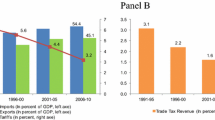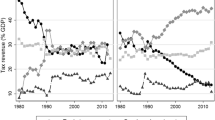Abstract
Many skeptics of trade liberalization in the developing world argue that lowering trade taxes can cause significant fiscal pressures in countries particularly reliant on these taxes and result in a reallocation of resources away from important development goals. This paper evaluates whether there is evidence that central governments systematically change the composition of spending priorities in the wake of lowered trade tax revenues as a share of total government revenues. We find no systematic evidence for this concern in a sample of 51 developing countries for the 1991 through 2005 period.
Similar content being viewed by others
References
Attanasio, O., Goldberg, P., & Pavcnik, N. (2004). Trade reforms and wage inequality in Colombia. Journal of Development Economics, 74(2), 331–366.
Arellano, M., & Bover, O. (1995). Another look at the instrumental variable estimation of error-components models. Journal of Econometrics, 68(1), 29–51.
Baunsgaard, T., & Keen, M. (2010). Tax revenue and (or?) trade liberalization. Journal of Public Economics, 94, 563–577.
Blundell, R., & Bond, S. (1998). Initial conditions and moment restrictions in dynamic panel data models. Journal of Econometrics, 87(1), 115–143.
Bruno, G. S. F. (2005). Estimation and inference in dynamic unbalanced panel data models with a small number of individuals. Stata Journal, 5(4), 473–500.
Choi, I. (2001). Unit root tests for panel data. Journal of International Money and Finance, 20(2), 292–372.
Correlates of War project. Available at http://www.correlatesofwar.org/.
Cragg, M., & Epelbaum, M. (1996). Why has wage dispersion grown in Mexico? Is it the incidence of reforms or the growing demand for skills? Journal of Development Economics, 51(1), 99–116.
Dreher, A., Sturm, J.-E., & Ursprung, H. (2008). The impact of globalization on the composition of government expenditures: evidence from panel data. Public Choice, 134(3–4), 263–292.
Emran, S., & Stiglitz, J. (2005). On selective indirect tax reform in developing countries. Journal of Public Economics, 89(4), 599–623.
Gemmell, N., Kneller, R., & Sanz, I. (2008). Foreign investment, international trade and the size and structure of public expenditures. European Journal of Political Economy, 24(1), 151–71.
Jamaica (2004). Jamaica trade policy review (WT/TPR/G/139).
Khattry, B., & Rao, M. (2002). Fiscal faux pas? An analysis of the revenue implications of trade liberalization. World Development, 30(8), 1431–1444.
Levin, A., Lin, C.-F., & Chu, C.-S. (2002). Unit root tests in panel data: asymptotic and finite-sample properties. Journal of Econometrics, 108(1), 1–24.
Monty, G. M., & Jaggers, K. (2002). Polity IV data set. [Computer file; version p4v2004] College Park, MD: Center for International Development and Conflict Management, University of Maryland.
Rodrik, D. (1998). Why do more open economies have bigger governments. Journal of Political Economy, 106(5), 997–1032.
Roodman, D. (2009). A note on the theme of too many instruments. Oxford Bulletin of Economics and Statistics, 71(1), 135–158.
Schulze, G., & Ursprung, H. (1999). Globalisation of the economy and the nation state. World Economy, 22(3), 295–352.
Saint, K., & Nevis (2003). Statement by Mr Horatio Versailles of Permanent Secretary, Ministry of International Trade and CARICOM Affairs (WT/MIN(03)/ST/123).
Schwert, W. G. (1989). Tests for unit roots: a Monte Carlo investigation. Journal of Business & Economic Statistics, 7(2), 147–159.
Uppsala Conflict Data Program (UCDP/PRIO). Available at http://www.prio.no/CSCW/Datasets/Armed-Conflict/UCDP-PRIO/.
Author information
Authors and Affiliations
Corresponding author
Rights and permissions
About this article
Cite this article
Moore, M.O., Zanardi, M. Does reduced trade tax revenue affect government spending patterns?. Int Tax Public Finance 18, 555–579 (2011). https://doi.org/10.1007/s10797-011-9191-y
Published:
Issue Date:
DOI: https://doi.org/10.1007/s10797-011-9191-y




